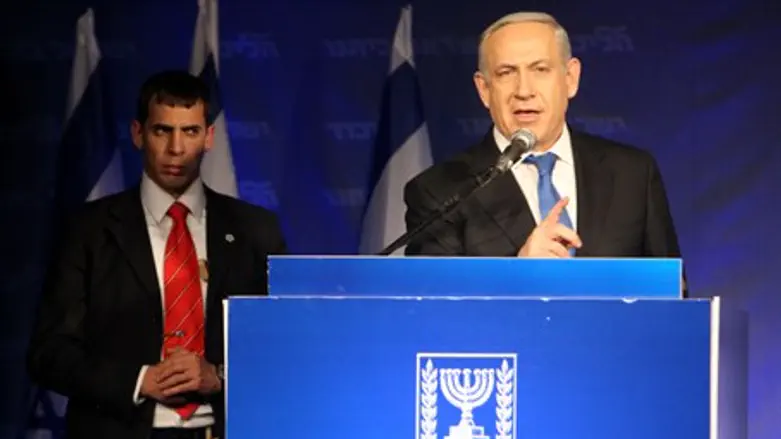
Prime Minister Binyamin Netanyahu is under fire from members of his own Likud party, over his treatment of Bayit Yehudi (Jewish Home) chairman Naftali Bennett, Channel 2 News reported on Saturday.
Likud officials were quoted in the report as having accused Netanyahu of attacking Bennett for personal reasons.
The Likud carried on a smear campaign of falsified character assassination against Bayit Yehudi candidates that was an integral part of their TV and radio ads. Part of this campaign included ads that portrayed some of the Jewish Home’s candidates as “extremists” and “sexist”.
The ads on TV featured caricature-like pictures of the candidates and a malicious-sounding dramatic voice asking if you had looked into who the people on Bennett's list really are before you decided to vote for him, followed by half-truths or total lies about each of those pictured.
If this campaign was not enough, after the results of the elections were publicized, Netanyahu chose to first speak with Yesh Atid chairman Yair Lapid, meeting him a few hours later. Netanyahu saved his phone call to Bennett for last.
The delay is widely seen as significant, since the order in which negotiations take place with parties determines which party will join the coalition first, and receive the "juiciest" portfolios, and which is "left to dry out."
The Likud officials told Channel 2 that Netanyahu’s attitude towards Bennett throughout the campaign and afterwards has been inappropriate, demeaning and solely based on personal reasons. The officials noted that Bennett is a legitimate partner for a coalition and wondered how Netanyahu could contact Lapid and Shas’s Aryeh Deri immediately after the election and only then phone Bennett.
Netanyahu's strained relationship with Bennett is an open secret, although Bennett denies it. According to persistent accounts, Bennett left his job as Netanyahu's chief of staff because he did not get along with his wife, Sarah, who is said by the media to be a dominant force in Netanyahu's decision making apparatus.
Besides the personal history between the two, Netanyahu may prefer to form a coalition without Bennett because he thinks Bennett's hard line on Judea and Samaria will make it more difficult for him to get along with U.S. President Barack Obama.
The same officials told Channel 2 that the negative campaign toward Bennett undoubtedly turned voters away from the Likud and caused them to vote for Yesh Atid, which became the Knesset’s second largest party.
The Likud, though still expected to form the coalition, has been significantly weakened with 31 seats for the joint Likud/Yisrael Beytenu list.
Knesset Member-elect Moshe Feiglin (Likud) had sharp words Thursday for his party's leaders over the election campaign that focused on attacking the Bayit Yehudi.
"The campaign of mudslinging was catastrophic, and a very grave act," Feiglin told Channel 2 News. "It hurt us, too. In the past weeks there were polls showing that Bayit Yehudi would receive 18 or 19 seats. The mudslinging drove the votes away from Bennett, but not to Likud – rather, to Yair Lapid."
"Likud shot itself in the foot and changed the relative size of the blocs," said Feiglin, and estimated that Likud lost five Knesset seats with its campaign. "We struck a blow against religious Zionism, which is our natural partner. We and the Bayit Yehudi will work shoulder to shoulder."
Likud Minister Gilad Erdan, however, denied that his party had attacked the Bayit Yehudi, saying the campaign merely intended to point out the differences between the two parties.
The Jewish Home, he said disingenuously, took votes from Likud “so naturally you want to highlight the differences between your list and his list, issues such as the status of women and refusal of orders.”
